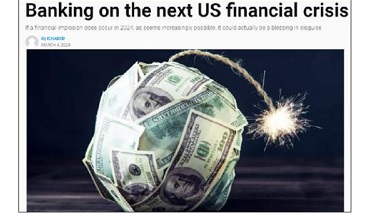The Australian Alert Service is the weekly publication of the Australian Citizens Party.
It will keep you updated on strategic events both in Australia, and worldwide, as well as the organising activities of the Citizens Party.
To subscribe to the Australian Alert Service, it's easy, and it's secure.
Lead Editorial
6 March 2024
Vol. 26 No. 10
The writing is on the wall for a new global financial crisis drastically worse than 2008. This reality is driving an intensive effort to consolidate control of banking by the City of London and Wall Street—to prevent the crisis leading to real change. Their efforts include the increasingly dangerous war drive (p. 7), to divide nations that would otherwise collaborate on a new economic agenda.
In a series of Asia Times articles, a former US diplomat writing under the name Ichabod has warned of a new US banking crash, making clear that the crisis which erupted a year ago is far from over. Then, US banks saw the value of their US Treasury bond holdings gouged by higher interest rates, but now high rates are also affecting the book value of their “mortgage-backed securities” (derivatives which triggered the 2008 crash). The US Federal Deposit Insurance Corporation reports that US banks’ unrealised losses on such securities soared to US$683.9 billion in the third quarter, up 22.5 per cent from the previous quarter, but experts say total losses could be at the US$1.5 trillion mark.
Another risk for US banks is default on commercial real estate (CRE) mortgages, for which the delinquency rate has tripled over the past year. Some affected banks, like Citigroup and Goldman Sachs, have reserves that don’t even reach half the value of their failing CRE loans. These are banks loaded up with derivatives, setting a fuse for the detonation of a bubble worth more than ten times the GDP of the world.
Against that backdrop, on 11 March the US Federal Reserve will end the Bank Term Funding Program (BTFP) it commenced a year ago to provide extra liquidity to troubled banks. During that crisis federal regulators allowed New York Community Bancorp to take over the failed Signature bank; now NYCB is itself in trouble, its share price having plummeted 65 per cent in late January and now downgraded to junk.
This may be the first real test of the bail-in laws enacted under the Dodd-Frank Wall Street Reform and Consumer Protection Act, passed in mid-2010, suggests Ichabod. The FDIC did not utilise bail-in for SVB and Signature Bank, he reported, knowing that confiscation of uninsured deposits would have led to a massive exodus of deposits from all US banks.
Back home, a new ANZ banking outage, a massive backlash over bank surcharges for use of cards, and renewed focus on the supermarket duopoly’s price-gouging, are feeding the drive for a complete revolution in banking.
Richard Denniss of the Australia Institute has called on the government to “provide a low-cost banking service— expanding on services it already offers”, just like when it ran the Commonwealth Bank, as the Australian National University’s Peter Martin approvingly reported in The Conversation on 27 February.
But the government push to give away its powers over the Reserve Bank of Australia has sparked the biggest shift. It reveals the coalescing efforts for economic justice, across numerous inquiries into corporate crime and corruption, which—as an AFR Rear Window column on a recent PwC scandal hearing observed on 4 March—has seen “Liberal, Labor and Green” collaboration, “partisanship gone”.
Last week’s hearing on the RBA reforms bill affirmed that Australia is unique in having government powers over the central bank. That is because the leaders who legislated it when trying to fix the economy had run into the buzzsaw of the City of London’s Money Power.
Then, as now, the problem is the economy, but in attempting to fix it we again run afoul of the High Priesthood of central banking, identified in the hearing by former Treasurer Peter Costello as the “cult of central bankers”. Whether they want to or not, with the oncoming crisis our leaders have to face these issues and must stand on the shoulders of Curtin and Chifley to do so.
In this issue:
- Paul Keating slams ASIO charade as ‘goon show’
- Vale Senator Linda White
- Argentines suffers fate of neoliberal fools
- Who says the private sector won’t rip you off?
- NATO berserkers escalate against Russia, amid warnings
- The USA’s world war on freedom of speech, part II: The Pacific theatre
- ACP activists at Beenleigh and Caboolture Forums
- A tribute to skills trainer Alan Baker
Click here to find out how to subscribe. For freely available AAS articles, click here.
Click here for the archive of previous issues of the Australian Alert Service








